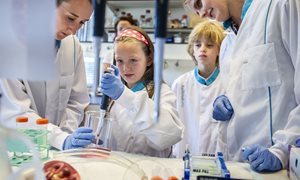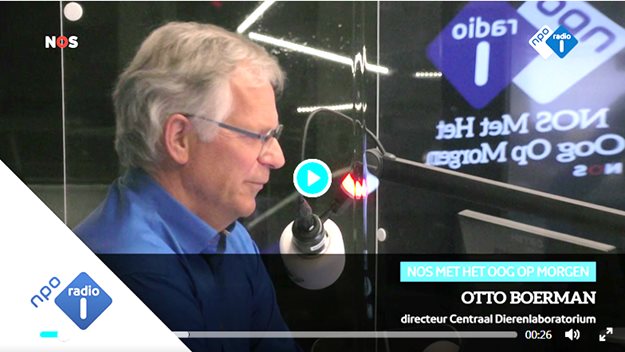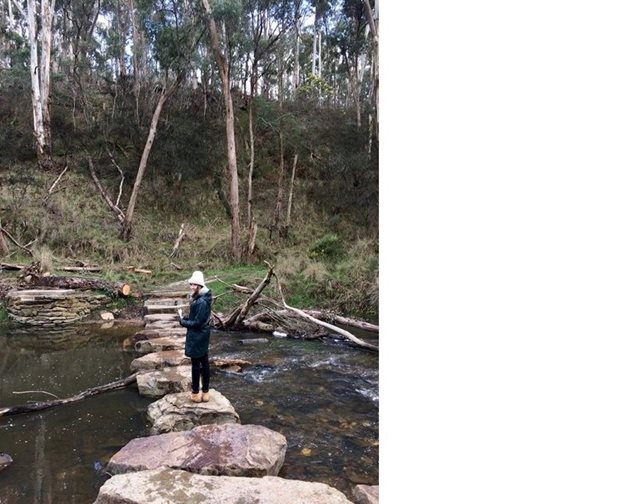Highlights

Our insights
Research with impact, that's what we stand for. We like to share our insights and results with the world around us. Where science and society meet, beautiful collaborations arise.
Patient journey: improving care by patient involvement
Publication from group of Nicoline Hoogerbrugge. read morePatient journey: improving care by patient involvement
ERN GENTURIS is the network leading on genetic tumour risk syndromes (genturis), which are inherited disorders which strongly predispose to the development of tumours. They share similar challenges: delay in diagnosis, lack of cancer prevention for patients and healthy relatives, and therapeutic. To overcome the hurdles every patient faces, ERN GENTURIS (www.genturis.eu) has developed an innovative visual approach for patient input into the Network, to share their expertise and experience: “Patient Journeys”.
Patient experience and satisfaction have been demonstrated to be the single most important aspect in assessing the quality of healthcare, and has even been shown to be a predictor of survival rates
Currently different initiatives to involve patients in developing clinical guidelines have been taken, however there is no common method that successfully integrates their experience and needs of living with a rare disease into development of healthcare services. To improve care for rare diseases we must draw on all the available knowledge, both from professional experts and patients, in order to improve care for every single patient in the world.
Matt Bolz-Johnson, Jelena Meek, Hoogerbrugge N. "Patient Journeys": improving care by patient involvement. European Journal of Human Genetics 28:141-143, 2020. PMID 31801983.

Siroon Bekkering presented Bessensap event online
She makes vlogs for NWO and others. videoSiroon Bekkering presented Bessensap event online
Bessensap’ is the annual Dutch science communication conference, bringing together scientists, journalists, press officers and science communicators. Due to the coronacrisis, this jubilee edition had to move online, too. But communicating in times of crisis, how do you achieve that efficiently? What ways are there to connect and how do you get your message across clearly, when everyone is at home and on Zoom? What is storytelling and how do you make a vlog? These and other questions were central to this edition of Bessensap 2020.
Siroon Bekkering actively participated in this edition. Interested, watch the recorging (in Dutch, 30 min).

Furthermore, Siroon has been a year and a half at the Royal Children's Hospital, Australia to perform research as a Rubicon awardee. For NWO she vlog-ed regularly about this experience.


Different projects for metabolic diseases
Two consortia: “United for metabolic diseases” and “MetaDome”. read moreDifferent projects for metabolic diseases
United for Metabolic disease
Six UMCs and a patient association are joined in the consortium “United for Metabolic Diseases” . To bring metabolic diseases to broader attention, umd.nl together with foundation Metakids has launched a media campaign, in which eight experts talk about metabolic diseases in the Mediaplanet.
Metabolic diseases are still an unknown major problem. Timely detection of metabolic diseases is vital. Six UMCs and a patient association are joined in the consortium “United for Metabolic Diseases”. To bring metabolic diseases to broader attention, umd.nl together with foundation Metakids has launched a media campaign, in which eight experts talk about metabolic diseases in the Mediaplanet.
Clara van Karnebeek, Research theme Metabolic disorders,“Early diagnosis is essential for rapid therapy and prevention to prevent irreparable damage. In the year 2020 this is possible! With one drop of blood, new technology will enable us to recognize hundreds of metabolic diseases simultaneously. A game changer by the combined forces in our UMD.”
MetaDome
MetaDome has been recognized in 2020 as one of the most accessed articles of 2018-2019 in Human Mutation.
Our researchers have developed MetaDome to survey regions in proteins that tolerate genetic variation. This helps to address the pathogenicity of genetic variants of unknown clinical significance. Using evolutionary relationships between protein domain homologues, MetaDome aggregates variation onto “meta-domains”. These meta-domains make the genetic variation map richer than individual protein domains. MetaDome additionally visualizes variation into a tolerance landscape, indicating regions within protein-coding genes that are more, or less, tolerant to variation.
The MetaDome was a project developed by Laurens van de Wiel, Christian Gilissen, and Gert Vriend and was first available online in spring 2018. Since then, it has been used by nearly 2,500 colleagues from various institutes across 64 countries.

Otto Boerman in the Dutch radio show "Met het oog op morgen".
Dutch radio interview about animal experiments in connection to vaccine development. videoOtto Boerman in the Dutch radio show "Met het oog op morgen".
Thursday 30 April 2020, Otto Boerman was interviewed on NPO radio 1 on studies in laboratory animals for the development of a vaccine against COVID-19. Otto Boerman, director of the Animal Research Facility (CDL) was interviewed during the radio show ‘Met het Oog op Morgen’ by Marcia Luyten.
The news that experts expect that the first vaccine against COVID-19 could be available in Q3 2020, prompted the interviewer to find out why these vaccine studies are carried out in Rhesus monkeys. Otto Boerman explained why the vast majority of animal studies are carried out in mice and rats, while other experiments are carried out in other species (e.g. guinea pigs, rabbits, sheep a.o.) and that a minority is carried out in nonhuman primates.

Teun Bousema, Julie Verhoef and Estel Collado Camps published an opinion article in De Volkskrant
About visiting international scientific conferences. read moreTeun Bousema, Julie Verhoef and Estel Collado Camps published an opinion article in De Volkskrant
Teun Bousema, Julie Verhoef, theme Infectious diseases and global health and Estel Collado, theme Nanomedicine, published an opinion article in De Volkskrant, about visiting international scientific conferences. They state that it is not contemporary to fly around the world for every congress.
Scientific conferences after Corona times should offer hybrid-conferences, with a mix of physical and online conferences, allowing scientists to make a more environmentally conscious choice. The Corona crisis made things possible that were thought to be impossible only one year ago.

A vlog about Recognition & Rewards
Science is a team effort! Then why are researcher mostly recognized on an individual basis? In this vlog, Siroon Bekkering uncovers the path towards new Recognition & Rewards of scientists and how team science should evolve within RIMLS. video
Podcast and mini-lectures
RIMLS researchers prepared podcasts and mini- lectures for different purposes. videoPodcast and mini-lectures
The new front line: big data podcast
What role do big data and technology play in the fight against COVID-19? What data can help save lives? How do you ensure that your personal health data is used safely?
In the podcast The Day (only available in Dutch) Merijn Doggen of RTL tech platform Bright talks about the big steps some countries are already taking in the way big data and artificial intelligence are used to predict and contain outbreaks.
Peter-Bram 't Hoen emphasizes that to make big data work for health one thing is very important: trust. He is therefore working on a large-scale new system that makes complex data studies in hospitals possible, without gaining insight into data at a personal level.
Interested? Listen to the podcast (20 min) here:
Mini-lecture on hereditary cancer
In 2020 there was no Open Day at the Radboudumc, but a two-day Online Discovery Tour with lot of activities for everyone. Number of top scientists prepared their lectures online. One of them, Nicoline Hoogerbrugge talked about hereditary cancers. Her mini-lecture: “How do you detect hereditary cancers?” (in Dutch) can be seen here:


Hans Jacobs signs collaboration agreement
with Erasmus MC and Sebia to develop personalized diagnostics. read moreHans Jacobs signs collaboration agreement
Radboudumc signs collaboration agreement to develop personalized diagnostics: The Radboudumc together with scientists from the Erasmus MC has signed a license agreement with Sebia, the world leader in multiple myeloma diagnostics.
Together with scientists from Erasmus MC, Radboudumc has signed a license agreement with Sebia, world leader in multiple myeloma diagnostics. This partnership enables the development of an ultra-sensitive blood assay that can detect minimal residual disease (MRD) in myeloma patients to guide optimal personalized treatment. Currently, MRD status is assessed on bone marrow aspirates. However, bone marrow sampling is invasive and introduces the risk of non-representative sampling due to heterogenous disease spreading. The new personalized targeted mass spectrometry technology developed by Erasmus MC and Radboudumc allows MRD monitoring directly in serum of myeloma patients.
“Through personalized diagnostics on one drop of blood, we can create a patient-friendly alternative to monitor MRD in myeloma patients,” says principal investigator Hans Jacobs, Theme Cancer development and immune defense. “This allows dynamic monitoring of patients with deep responses, which is crucial for early detection of disease relapse. This assay will greatly support the path towards precision medicine in these patients.”
"In this approach we combine technology innovation with clinical impact by developing and applying truly personalized diagnostics for Multiple Myeloma care, a beautiful showcase of translational biomarker work by collaboration", says Alain van Gool, Theme Metabolic disorders.

Khondrion initiated study on optimal dosage of new drug
The company specializes in drugs for people with hereditary mitochondrial disease. read moreKhondrion initiated study on optimal dosage of new drug
Khondrion was founded by Jan Smeitink, theme Metabolic disorders. The company specializes in drugs for people with hereditary mitochondrial disease – also known as energy metabolic disorders.
Pharmaceutical company Khondrion, a spin-off from Radboud university medical center, has taken another important step in the development of its drug sonlicromanol. The first patients have used the drug as part of a phase 2b study, which focuses on determining the optimum dose and efficacy. The results of the study are expected at the end of this year.
Biological battery
Khondrion was founded by Jan Smeitink, theme Metabolic disorders. The company specializes in drugs for people with hereditary mitochondrial disease – also known as energy metabolic disorders. Mitochondria are organelles that are found in the cells of most eukaryotic organisms. They generate most of the cell's supply of adenosine triphosphate (ATP), which is used as a source of chemical energy. Mitochondria can be compared to biological batteries. These batteries may become defective due to changes in the DNA, which can cause disorders such as MELAS and MIDD. MELAS stands for Mitochondrial Encephalomyopathy, Lactate Acidosis and Stroke-like episodes. MIDD stands for maternally inherited diabetes and deafness. Sonlicromanol has been developed to treat these disorders.
Three international centers
The phase 2b study is funded in part by a European Horizon 2020 grant of more than €2 million that the company received previously. The main outcomes of the study are the optimal dose of the drug and its efficacy for the patients participating in the study. These patients are being treated at three internationally recognized centers for mitochondrial diseases in Europe; the University of Newcastle (UK), LMU Munich (Germany) and Radboud university medical center.
Improved cognition
Smeitink describes the study: “We are mainly investigating whether the drug improves cognition. We found indications for this in the phase 2a study. In the current study we are determining the dosage of sonlicromanol that results in improvements in the patients’ perception, thinking, memory, attention and concentration. Our aim is therefore to confirm the previously found positive effects on cognition and – if this is confirmed – to determine the most effective dose. The study is double-blind and is randomized into two groups, one receiving sonlicromanol and the other a placebo. We expect the results in the second half of 2020."
Substantial impact
In the previous phase 1 and phase 2a studies, the efficacy and safety of sonlicromanol were assessed positively. "The start of this phase 2b study is another important milestone for Khondrion," says Smeitink. “We not only want to make the drug available to treat patients with this specific condition, but also for many other energy metabolic disorders. The impact of this kind of disorder on patients’ daily lives can be substantial, especially due to cognitive impairment. In the second half of 2020, we expect to start the first trial in children with energy metabolic disorders. It would be fantastic if sonlicromanol could soon improve the quality of life of patients with mitochondrial disease."

Jeroen van den Heuvel presented in the Dutch TV program “Het Klokhuis”
about the effects of painkillers (in Dutch). videoJeroen van den Heuvel presented in the Dutch TV program “Het Klokhuis”
Jeroen van den Heuvel, research technician at the Dept. of Pharmacology and Toxicology, presented in the popular Dutch TV program for the children “Het Klokhuis” about the effects of painkillers. Het Klokhuis is a program that informs children from nine to twelve about the world around them, in the broadest sense of the word, and it is often watched at schools as School TV.
Curious? Check the video here (only in Dutch)


